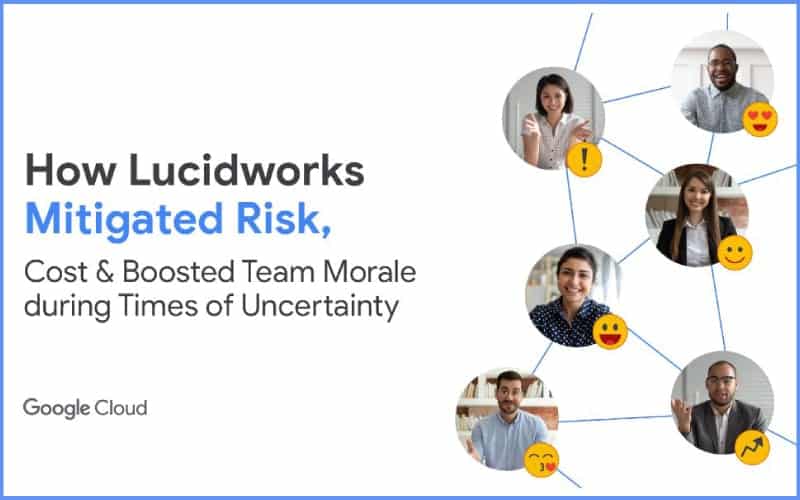Lucidworks Discusses COVID Response in Webcast with Google Cloud
CEO Will Hayes talks with Google Cloud about how Lucidworks shifted business to support employees, address changing customer needs, and accelerate innovation.

I had the opportunity to connect with the Google Cloud team and share how we’ve responded to seismic changes over the past few months at Lucidworks, including what lessons we’re taking into the future, and how we’re finding new ways to support customers in an unpredictable market.
People First
Our customers are served by our teams which are made of individual people who are all experiencing this transition in different ways. Leading with empathy and committing to “Honor People” was the biggest drive in our decision making when mandatory remote work began in March. We continue to make decisions that put our employees first with the belief that if they’re supported, they will do their best work which is passed on to our customers and partners. Our people are the core of what we do and our primary response was dedicated to their well-being, with the business second.
We’re lucky that much of our team has been distributed since Day 1 of the company. Nonetheless, we’re still working to find ways to keep people motivated; it’s tough to get the same level of energy and excitement through a web meeting. That being said, we’ve adopted a couple new things like “no meeting Fridays” to give people a much needed break from video calls and rethink the purpose of meetings to ensure they’re driving enough change to make them worthwhile. We’ve also issued a survey to see how employees are feeling about returning to work at some point. This survey will be our guiding light in terms of how we think about the needs and desires of our team members as it relates to returning to the office.
Slow Down to Speed Up
One of our Lucidworks values is “Champion Customers.” We started realizing back in February that we would need to reprioritize features and roadmap to provide relief and leverage to our customers who would be impacted. We understood the increased support challenges facing customers during the COVID-19 crisis with newly remote workforces and the importance of digital touchpoints. In response, we pushed up the release date of Smart Answers on Lucidworks Fusion. Smart Answers enhances chatbots and digital assistants to provide better answers to the people our customers serve to relieve overburdened call centers and help customers and employees self-solve.
As more began to close down, everything around the world slowed down. We quickly pivoted from the rapid growth cycle and reactive decision making we’d been experiencing, and took this as an opportunity to invest in R&D and accelerate innovation. We’ve been able to start longer tail R&D research projects, address technical debt, and expand the R&D team now that field demand has slowed. We don’t get a lot of time to try new things on a hunch, so we’re enjoying this opportunity to test new ideas and better respond to shifting customer needs.
Rapid Transition to Cloud
Our customers are heavily concentrated in industries that have been around for over a century — healthcare, financial services, retail. A lot of institutional information is still trapped behind in-person conversations, and these companies have historically been on the later edge of adopting new technologies. Now digital transformation requirements are being accelerated by about 10 years. (Read more about the business benefits of cloud computing.)
We primarily serve the Global 2000 and every enterprise conversation of late has been focused on cloud. It’s exciting to see the acceleration of this transition to the cloud happening before our eyes. A portion of the business we assumed would be on prem is now moving to the cloud and you’ll see that our product roadmap and vision are reflective of this larger market shift.
Lessons Learned
Rachael Ropeik, Enterprise Account Executive at Google Cloud, asked me if we’d be taking any lessons from this time into the future. The big takeaway from these past couple months is efficiency. When you’re in a hyper growth stage you’re very reactive to customers, partners, new markets, etc. and the initial instinct is to continue to invest. When you start to see investments pile on top of each other, you wonder if there’s a way to do things more efficiently. This time has taught us that, yes, there is. The fact that we can continue at the pace we’re at and honor our people and champion our customers given the current circumstances is a major lesson learned in efficiency.
Also, breaking out of our individual silos has been critical. Individual departments tend to get tunnel vision and miss the opportunity to do things more efficiently or collaborate across teams to stoke new ideas. My hope is that we remember the importance of going outside of our title and team to ensure colleagues are supported and can be successful, in turn passing it onto our customers and partners so they can be successful.
We send our good wishes and support to everyone who’s continuing to learn how to adapt to this new normal. If you’re interested in learning more about the work we’re doing at Lucidworks, don’t hesitate to reach out. If you’re looking for more tips to support customers across digital channels, check out this post from Justin Sears.
LEARN MORE
Contact us today to learn how Lucidworks can help your team create powerful search and discovery applications for your customers and employees.